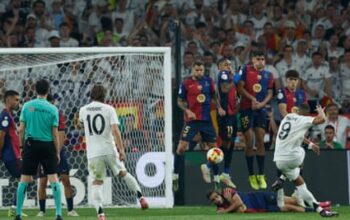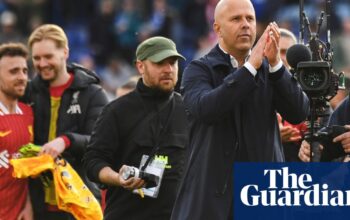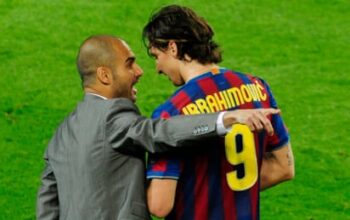“I love watching the Championship,” Marcel Desailly says. “Usually I don’t watch a full 90 minutes unless I’m working on a game in the studio. But I love to watch 90 minutes of Championship matches. The intensity is just incredible. And technically, they can really play.”
Perhaps this was not what you were expecting to hear from a winner of the Champions League with Marseille and Milan, the World Cup and European Championship with France, an imperious defender who spent most of his career at the very highest levels of the game. But in many ways Desailly has always been an instinctively counterintuitive figure. He left Serie A when it was the best league in the world and moved to Chelsea, who weren’t even the best club in London. He moved to Qatar in the mid-2000s, long before it became a global footballing powerhouse.
His tactical and technical expertise would have made him a brilliant coach. Instead he is perfectly content to do whatever moves him: a little business, a little charity work, a little punditry, a new Fifa documentary series called Moment of Truth, which is now available in the UK for the first time. He is speaking now from Doha, where he has been working on beIN Sport’s Champions League coverage.
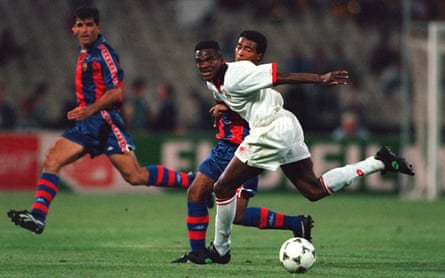
Partly as interview research and partly for pleasure, I rewatched the 1994 European Cup final between Milan and Barcelona in advance. You may have forgotten, as I did, that Desailly played that game in midfield: an utterly dominant performance in which he scored Milan’s fourth goal and bullied a waifish Barcelona playmaker by the name of Pep Guardiola.
Given the way the game has evolved in the past 30 years, I was curious. Could he still play that role today? Does it even exist?
“From ’94 to ’96 or ’97, I was the best defensive midfielder in the market,” Desailly says. “I was spot on in the moment where football was not that technical, where you could use your physicality. Then in 1997, I realised that football was really changing. More technical players were coming into the system. You had Patrick Vieira, who came to Milan. You had Edgar Davids.
“It was the beginning of these players who could use the ball – tick, tick, tick, one touch. And when you put pressure on them, they had the ability to turn and play the ball. My strength was to come quick, strong on you, and back in the day you knew you could get the ball. Now you have players like Kroos or Modric, Seedorf or Pirlo after me, who could play in the intervals and kill your pressing straight away.
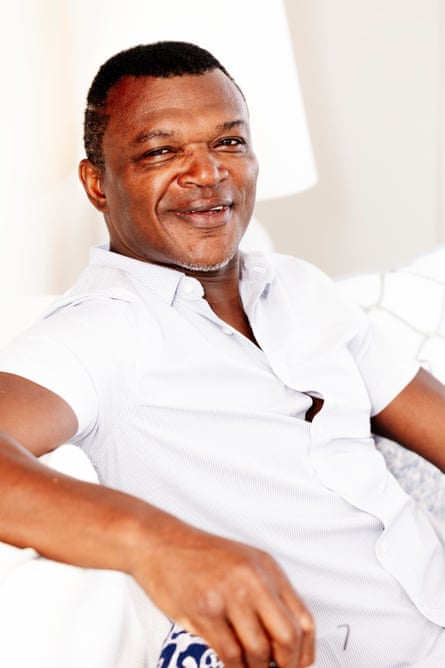
“The fitness has changed a lot. And aside from fitness, the technical usage, the way everyone has ability with the ball. We were stopping it with the side of the foot. Now they put their feet on top, and move it in the orientation they want. I had a discussion with Frank Lampard once. I asked: is it really faster than when I was playing? And he replied: no, it’s not faster. It’s just that players have much more ability and understanding of tactics. So could I have played today as a defender? Yes. As a midfielder? No.”
It feels like a good moment to ask Desailly why he never became a coach. “I did my coaching badges,” he replies. “The only reason I didn’t go for it is the lifestyle. I didn’t want to be obsessed with only one thing in my life. Because when you are a coach, it’s 100% of your soul. You need to kill the knowledge you have built over 20 years of being a soccer player, recreate a different philosophy and be able to put it in place. I wasn’t ready to face the frustration.”
Desailly is also sceptical of the idea that the way to fix the governance of the game is to get more former players in positions of power. “How many of us have a university background or are willing to sit in an office?” he asks. “Without the smell of the grass, without access to the players, the dressing room, the sweat? Few of us have the desire to go into that field. Besides, we had Platini. And you saw what happened to him.”
And yet none of this should be misconstrued as a kind of withdrawal or apathy. Indeed, Desailly cares deeply about the game and is fully prepared to speak out on issues that matter to him. “It’s good to have soccer players with opinions,” he says, and in this area he speaks from experience. As a key member of the multicultural France team that lifted the World Cup in 1998 and stood up to the rising threat of the far right four years later, Desailly helped pave the way for the current generation, many of whom spoke so powerfully in similar circumstances this summer.
after newsletter promotion
“The players of the French team, diverse in their origins … are today unanimous in condemning the resurgent notions of exclusion and racism,” Desailly declared in 2002 in response to the emergent threat of the Front National under their leader Jean-Marie Le Pen. Now, again, football finds itself a locus of resistance. During Euro 2024 players such as Jules Koundé, Kylian Mbappé and Marcus Thuram spoke out against the rise of the rebranded Rassemblement National. With the far-right again on the march, with Le Pen’s daughter Marine at the gates of power, it is tempting to ask Desailly if anything has really changed in two decades.
But Desailly is adamant that battles have already been won. A generation ago, he reminds us, he and his teammates were fighting for the very right to be seen as French. “Now,” he says, “we are coming into a new era. This is the third generation. They are born in France. Although there is racism, politicians now are careful what they say. So you only go after the people who are illegal, no documentation. She [Le Pen] points only to this now.”
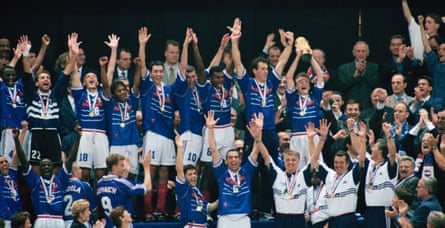
He is full of admiration for Koundé and Mbappé, who have used their platform to speak out. “Slowly, slowly, footballers are having opinions,” he says. “It’s not about racism any more, or at least not that simple. Their opinion was that the extreme right was not good for the growth of the country. So they tried to raise the attention of young people. And it’s been a good thing, because they’ve not been able to enter the system.” Just as the FN were ultimately defeated in 2002, in the recent legislative elections the RN were beaten back into third place.
Perhaps the lesson here is that Desailly may pick and choose his projects, but when he does he commits to them. Besides, he has always resisted being defined as one thing. Defender and midfielder; worker and leader; politician and philanthropist; French and Ghanaian; Champions League pundit and EFL aficionado. This is a man of many masks, and he wears them all with a certain contentment.
“I’m lucky,” he says. “Because of my wealth, I’ve been able to create an academy and do a lot of charity work in Ghana, to give back a little bit. And at the same time I continue to stay very close to football. I’m involved with Fifa. I’m involved with Uefa. It’s much more useful than being a coach, taking care of only one team. I don’t know if I was a star, but I’m now a legend. And through the legend, I feel the sun is shining.”
Source: theguardian.com
